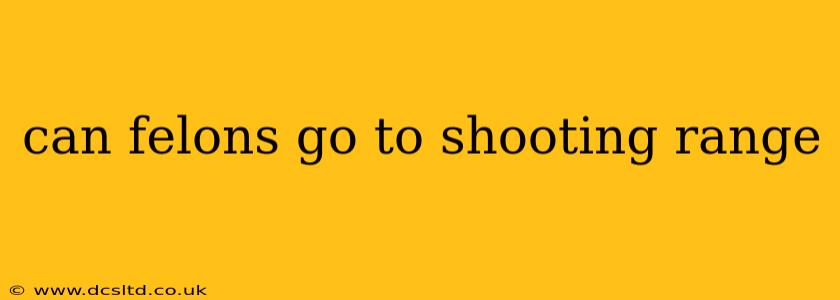The question of whether felons can go to a shooting range is complex and doesn't have a simple yes or no answer. It hinges on a variety of factors, primarily the specific state laws and the nature of the felony conviction. Federal law prohibits convicted felons from possessing firearms, but state laws vary significantly. This means a felon's ability to visit a shooting range depends entirely on their location and their specific legal situation.
Let's break down the key aspects:
What are the Federal Laws Regarding Felons and Firearms?
Federal law, under the Gun Control Act of 1968, generally prohibits convicted felons from possessing firearms. This includes handguns, rifles, shotguns, and any other firearm defined under federal law. The definition of "felon" can also be quite broad, encompassing individuals convicted of certain misdemeanors as well as felonies. This prohibition is a serious matter with severe legal consequences for those who violate it.
How Do State Laws Differ?
State laws regarding firearm ownership and possession by felons vary considerably. Some states have more restrictive laws than the federal government, while others may have exceptions or processes for restoring firearm rights. Some states might allow felons to visit a shooting range under specific circumstances, such as supervised participation in a rehabilitation program or with explicit permission from a court. Others may have complete bans on any firearm access for convicted felons.
Can a Felon Go to a Shooting Range Under Supervision?
This depends entirely on state and local laws. Some jurisdictions may permit supervised access to firearms for rehabilitative purposes. This might involve participation in a court-ordered program, with a designated official present to oversee all firearm handling. However, even in such cases, the felon wouldn't necessarily have full access to the shooting range but would likely be under strict guidance.
What About Expungement or Pardons?
In some states, expungement of a criminal record or a pardon from the governor can restore a felon's right to possess firearms. This process can vary significantly depending on the state and the type of offense. Even with expungement or a pardon, however, it's crucial to check with state and local authorities to confirm the restoration of firearm rights before attempting to access a shooting range.
What are the Consequences of Illegal Firearm Possession?
The consequences of a felon illegally possessing a firearm or attempting to access a shooting range without legal permission are severe. This can result in significant prison time, hefty fines, and a permanent loss of firearm rights. It is crucial to seek legal counsel to understand your specific situation and legal rights regarding firearm ownership.
How can a felon determine their eligibility to visit a shooting range?
The best way for a felon to determine their eligibility is to consult with a qualified legal professional specializing in gun laws in their specific state. They can provide accurate information based on the individual's criminal history and state laws. Additionally, contacting state-level authorities responsible for firearm regulation may offer further clarification.
Disclaimer: This information is for educational purposes only and should not be considered legal advice. State and federal laws regarding firearm possession are complex and constantly evolving. It's crucial to seek legal counsel for any specific situation.
